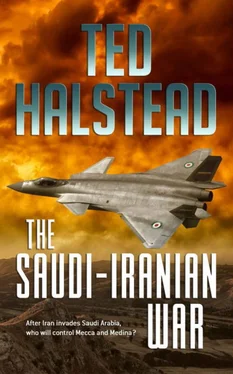Ted Halstead - The Saudi-Iranian War
Здесь есть возможность читать онлайн «Ted Halstead - The Saudi-Iranian War» весь текст электронной книги совершенно бесплатно (целиком полную версию без сокращений). В некоторых случаях можно слушать аудио, скачать через торрент в формате fb2 и присутствует краткое содержание. Год выпуска: 2019, Издательство: Independently published, Жанр: Боевая фантастика, Триллер, на английском языке. Описание произведения, (предисловие) а так же отзывы посетителей доступны на портале библиотеки ЛибКат.
- Название:The Saudi-Iranian War
- Автор:
- Издательство:Independently published
- Жанр:
- Год:2019
- ISBN:нет данных
- Рейтинг книги:4 / 5. Голосов: 1
-
Избранное:Добавить в избранное
- Отзывы:
-
Ваша оценка:
- 80
- 1
- 2
- 3
- 4
- 5
The Saudi-Iranian War: краткое содержание, описание и аннотация
Предлагаем к чтению аннотацию, описание, краткое содержание или предисловие (зависит от того, что написал сам автор книги «The Saudi-Iranian War»). Если вы не нашли необходимую информацию о книге — напишите в комментариях, мы постараемся отыскать её.
The Saudi-Iranian War — читать онлайн бесплатно полную книгу (весь текст) целиком
Ниже представлен текст книги, разбитый по страницам. Система сохранения места последней прочитанной страницы, позволяет с удобством читать онлайн бесплатно книгу «The Saudi-Iranian War», без необходимости каждый раз заново искать на чём Вы остановились. Поставьте закладку, и сможете в любой момент перейти на страницу, на которой закончили чтение.
Интервал:
Закладка:
Arabia was one or more of the T-72s captured by Syrian rebels being used in a raid. And that scenario required them to pass through Iraq, since no part of Syria bordered the Kingdom.
What was left of the Syrian rebel forces now, though, would never use its few remaining tanks on such a pointless suicide mission.
Most of the countries that bordered the Kingdom were either allies like the United Arab Emirates, Kuwait and Oman, or dependent on Saudi financial and military aid like Jordan and Bahrain.
They were addressing Yemen. That left Iraq. Since the Americans ended Saddam Hussein’s regime Iraq had been far too occupied with its own survival to threaten anyone, up until very recently. Even now, there were regular bombings in Baghdad markets, and though ISIS no longer had a Caliphate it still had followers. The last election there had put in a government that seemed friendlier to Iran, but it still seemed quite a stretch to call it an Iranian ally. Anyway, the GIP didn’t see Iraq as a threat.
Of course, the GIP had also failed to predict Iraq’s annexation of Kuwait.
Ali pushed that thought firmly out of his head.
The Crown Prince nodded, and then asked in a neutral tone, “You have seen the reports that the last deliveries of Leopard 2A7s have been made to Qatar, replacing their AMX-30s. Do you think our M60s are a match for the Leopards?”
Ali shrugged. “Tank for tank, no. But even after the latest delivery, they only have a total of two hundred Leopards. They have to know that if they attacked us we could end their tiny country and make it a Saudi province. Since Qatar kicked out the Americans last year, they no longer have a protector, unless you count Iran on the other side of the Gulf. I just don’t see them as a threat.”
The Crown Prince nodded again. “GIP agrees with you. I’m still not happy to see the Qataris arming themselves with a tank that has a better main gun than our M1A2s.”
Ali shrugged agreement, but said nothing. It was true that Rheinmetall, the German company that had manufactured the main gun used on both the original Leopards and every M1 model, had developed the improved 120mm smoothbore cannon fitted in the Leopard 2A6 and later models. The key improvement was that the L/55 cannon added fifteen hundred meters to the range of the original L/44 cannon mounted on his M1A2s. As a bonus, the L/55 increased the velocity of armor piercing ammo to 1,800 m/s.
This would be bad news for any of his M1A2s facing a Leopard 2A7. It would be worse news for any of his M60s.
The Crown Prince continued, “Qatar said they asked the Americans to vacate their Central Command headquarters in their country because they had sided with us when we reimposed the blockade. That made sense, and I never questioned the GIP’s reports on the matter. I wonder now, though, whether they did it to have the freedom to break out of our blockade.”
Before Ali could even think of a way to politely reply that the idea was ridiculous, the Crown Prince beat him to it.
“No, Ali, you’re right. The Qataris don’t have the nerve to risk their independence by attacking us, and the Iraqis are busy with their own problems. We will proceed with your proposed deployment to Yemen.”
The Crown Prince paused. “But I want to inspect those M60s personally. They need to be in fighting shape and ready for deployment to our northern and eastern borders before your extra Abrams move to Yemen. And all the M1A2s that aren’t already blockading Qatar or going to Yemen will stay right here in the capital region.”
Ali simply nodded and said, “Yes, Minister.” It was easy to agree since his fellow tanker, as he privately thought of the Crown Prince, was telling him to do what he had planned to do already.
“And Ali,” the Crown Prince continued, “make sure you stay put in Saada province, and don’t push further south. If there is any trouble, I want to be sure your M1A2s can get back in a hurry.”
Ali nodded, privately thinking to himself that the Crown Prince was starting to show his age. He was worrying like an old woman.
It would not be long before Ali looked back at this moment, and remembered that with age also came wisdom.
Chapter Two
Colonel Hamid Mazdaki sat on his pack in the shade of his Zulfiqar-3 tank, ate his meal, and looked at the Euphrates flow by. Smoke was still rising from some of the buildings the tanks of his regiment had just leveled, and he knew that one of those thrice-cursed rebel snipers could be taking aim at him as he chewed.
He was too tired to care.
This was supposed to be their last mission before they passed out of Syria and crossed through Iraq on their way to home in Iran. Most soldiers were especially cautious when reaching the end of a deployment, and normally Hamid would have been no exception.
The difference this time was that their most important mission was still ahead. And it was one Hamid did not expect to survive. He was willing to undertake it because he would finally achieve his lifelong dream of avenging his father’s death at the hands of Saudi soldiers during the 1987 “Mecca Incident” which killed over four hundred people, most of them Iranian pilgrims like his father. Hamid had been just an infant at the time.
Hamid’s mother had been crushed by his father’s death, and sought to go on the pilgrimage herself to honor his memory. After being told she would be able to go the year after his death, her Saudi permit was revoked when the number of pilgrims allowed from Iran was reduced from 150,000 to 45,000.
Iran boycotted the pilgrimage for the next three years, during which his mother wasted away, and finally died. Hamid was raised by an aunt and uncle who treated him… harshly.
After Hamid enlisted, he repeatedly tried to go on the pilgrimage himself, but every year either duty intervened or he was not lucky enough to get one of the limited spaces the Saudis doled out by nationality. Then after the 2015 stampede in Mecca where 2,400 pilgrims died, over 400 of them Iranians, pilgrims from Iran were again no longer welcome. Of course, both the Saudis and Iranians blamed each other.
Then, many Iranians started calling for a boycott of the pilgrimage, because the Saudis were using profits from it to fund their war against the Shi’a in Yemen.
As far as Hamid was concerned it was clear who was responsible for everything he, his family and his countrymen had suffered when trying to perform the pilgrimage to Mecca. The Saudis.
The mission that would give Hamid the vengeance he had craved for so many years was also one that almost nobody in Iran knew about. Not so long ago, that would have been impossible.
In 2008 a drastic reorganization of the Islamic Revolutionary Guard Corps (IRGC), or Pasdaran, had created thirty-one autonomous provincial corps.
This new decentralized structure gave corps commanders substantial leeway, from the equipment they requisitioned to selection of regimental commanders, and even the missions they requested.
In the case of Hamid’s provincial corps the equipment was tank-heavy, the regimental commanders were loyal solely to the general in command of the corps, and they volunteered for duty in Syria at every opportunity. The tanks were a mix of Zulfiqar-3 and recently purchased Russian T-90s, and a single very new Russian T-14 Armata.
The Zulfiqar-3 was the latest in a series of tanks designed and built in Iran, a necessity forced upon it by years of international sanctions. However, it was a challenge many Iranians welcomed, since sanctions or no it was important not to depend on foreigners for the defense of the revolution. It was primarily based on the American M60 and Russian T-72 tanks, but Hamid thought its fully stabilized 125mm smoothbore cannon, composite armor, autoloader and improved fire control system gave it an edge over both tanks.
Читать дальшеИнтервал:
Закладка:
Похожие книги на «The Saudi-Iranian War»
Представляем Вашему вниманию похожие книги на «The Saudi-Iranian War» списком для выбора. Мы отобрали схожую по названию и смыслу литературу в надежде предоставить читателям больше вариантов отыскать новые, интересные, ещё непрочитанные произведения.
Обсуждение, отзывы о книге «The Saudi-Iranian War» и просто собственные мнения читателей. Оставьте ваши комментарии, напишите, что Вы думаете о произведении, его смысле или главных героях. Укажите что конкретно понравилось, а что нет, и почему Вы так считаете.












